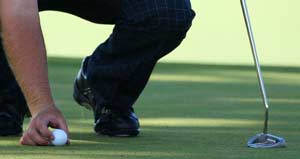The Hacker: Boar driven wild by club who won't allow him full allowance

After a four-year battle to persuade his club to lift the handicap limit in competitions, a 75-year-old hacker has decided to give up golf out of sheer frustration.
I often threaten to do the same but my frustration is with my game not my club, who have done very well in complying with the handicap directive issued by Congu.
Most hackers have similarly benefited in the last two years from receiving their full entitlement of shots in all tournaments. But not Keith Boar, who plays off 22 at a Lancashire club who are sticking stubbornly to the old 18 handicap limit in stroke-play competitions.
He has taken his complaint to the highest authorities but while he has found sympathy at the Lancashire Golf Union, the English Golf Union, Congu and the Royal & Ancient, there is little they can do.
There was a general spasm of horror among low-handicappers when Congu announced after thorough research that the handicap allowances to the less gifted players was so unfair as to need immediate reform.
Congu are the body, made up of our national golf unions, responsible for running the very efficient handicap system without which the game wouldn't function.
And it took courage to confront clubs with evidence that the system they had been using for generations was faulty and extremely unfair.
Better players needed to give opponents only three-quarters of the difference between their handicaps. Not only did no one know what that rule was based on, we were the only nation in the world in which it was applied.
When Congu examined club competition statistics from both sides of the Atlantic they could find no justification for it.
Indeed, to be absolutely fair to the higher handicapper, the stroke allowance ought to be one-and-a-quarter times the difference. Congu didn't go that far and settled for the full difference.
Good players were threatening not to enter tournaments because they were convinced that, armed with extra shots, the hackers would swoop down from the hills and massacre them.
It hasn't happened. As in the FA Cup, some minnows will have their day but the odds are still very much in favour of the better players.
Whereas Congu can dictate in matters concerning the handicap system in match play, they are not empowered to dictate on handicap limits in strokeplay competitions, though they may use stronger persuasive words in the next rules handbook in 2011.
"We don't like it," says Congu secretary Melvyn Goddard, "and it is not in the spirit of the game. There is overwhelming evidence that limits are unfair and the majority of clubs can see that. But some are reluctant to change, particularly in competitions that could have been going for a century."
Keith argues: "The rules could be amended, of course, to force them to change but I have to admit I'm not going to win this Boar war."
It might strengthen his case if other high-handicappers had a similar experience at their clubs. It would be interesting to hear from them.
Hackers, especially old ones, are regarded as a necessary evil – evil because they get in the way; necessary because they make an important financial contribution. If thousands of Keith Boars packed it in, the future of club golf wouldn't look too healthy.
Tip of the week
No 61: Picture the shot
The most difficult shot in golf is the straight shot. It doesn't matter what your preferred ball-flight is, the most important thing is to visualise the shot before you play it. It is much easier to make the body do what you want it to when you can see the shot you want to play.
For example, if you are looking to play a draw shot from right to left (for right-handed golfers) you need to imagine how far right the ball will start of the target and visualise it finishing on the target with a certain amount of draw spin. Without this visualisation it is difficult to pull off the shot, however good your technique is.
Even if your natural shot is a big fade, try to picture the shot before you play it and you'll pull it off more frequently.
Simon Iliffe, Head Professional, Bramley GC, Surrey. www.theshortgame.co.uk
Subscribe to Independent Premium to bookmark this article
Want to bookmark your favourite articles and stories to read or reference later? Start your Independent Premium subscription today.

Join our commenting forum
Join thought-provoking conversations, follow other Independent readers and see their replies